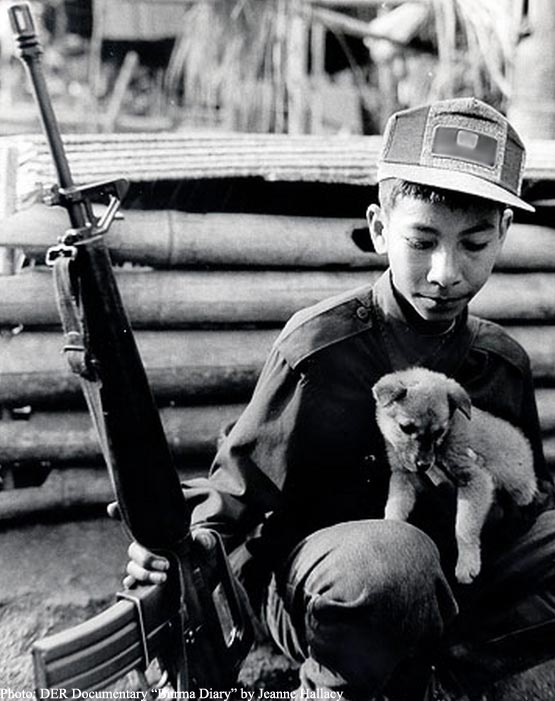Soon you could see child soldiers like this donning the iconic blue helmet of the UN peacekeepers.
That is essentially the recommendation raised by UN Special Envoy to Burma Vijay Nambiar. During a visit to Nay Pyi Taw in January, Nambiar suggested to Burmese Defense Commander-in-Chief Aung Hlaing that the Burmese military start sending troops on UN peacekeeping missions. Nambiar cited Burma’s “progress in internal peace and military transparency” as justification for his invitation.
If child soldiers, rape, arbitrary arrests, torture, and attacking villages count as “progress,” then perhaps Mr. Nambiar is right, and the Tatmadaw deserves a pat on the back. But clearly, a military that recruits children into its ranks has no business on UN peacekeeping missions. To invite the Burmese military to become UN peacekeepers would be to make a mockery of the UN as an international peacekeeping institution.
UN Special Rapporteur on the human rights situation in Burma Tomas Ojea Quintana knows that and has spent years monitoring the Tatmadaw. Quintana is concluding his six-year mandate working to end practices like the recruitment of child soldiers and advance human rights in Burma. On March 17, he presented his final report to the UN Human Rights Council in Geneva on the status of Burma’s human rights, and his findings demonstrate that the Tatmadaw continues to commit crimes against humanity and war crimes with impunity.
“[T]here is not progress in tackling the impunity under which the military forces currently operate,” he writes. Burma’s military-drafted Constitution institutionalizes this legal impunity, reinforcing a military culture of abuse without consequence.
The 2008 Constitution was perhaps the crowning achievement of the military regime. It ensures military control of the government through a clever legislative catch: 25% of parliamentary seats are reserved for the military, and any proposed constitutional amendment needs more than 75% of parliament’s backing to pass. An amendment without military support is hopeless. Quintana echoes this in his report: “[T]he military retains a prevailing role in the life and institutions of Myanmar…moreover, the rule of law cannot yet be said to exist in Myanmar.”
Burma’s constitutional rule of law is partial not only to the military, but also to the military’s crimes. The military has little motivation to revise these favorable constitutional provisions. But preservation of the Constitution, and, in effect, military rule, will allow gross human rights violations like the recruitment and use of child soldiers to continue. After years of being identified by the UN as a “persistent perpetrator” of child soldier recruitment, the Burmese government signed a joint action plan with the UN in June 2012 to end its recruitment of child soldiers by the end of 2013. However, last May, a full year since the launch of the action plan, USCB, along with ALTSEAN-Burma other NGOs, found the Burmese government had failed to meet its commitments and that its actions amount to non-compliance.
The action plan’s deadline has come and gone, but Burma has persistently avoided implementation. Quintana calls on the government to “..accelerate the identification and release of all children in the national armed forces and border guard forces.” But international calls have fallen on deaf ears—the military is unwilling to prioritize releasing Burma’s children from its armed ranks.
The military’s human rights violations continue unchecked, and the military has made clear its opposition to constitutional reform. The military undermines efforts toward peace and national reconciliation, and continually violates ceasefire agreements across the country. Nambiar’s nonsense belief that the Tatmadaw should act as peacekeepers abroad while it blatantly subverts peace at home is unconscionable. Burma’s military is not remotely qualified to be welcomed on the world stage as UN peacekeepers.
